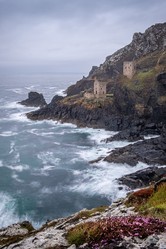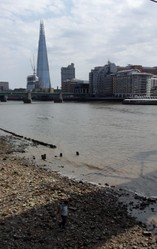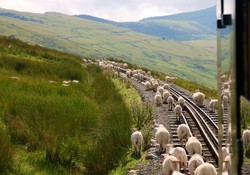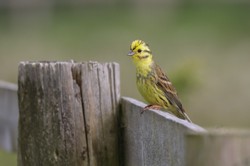Though the Winns dwelt in South Wales they chose to take the South West Path, which is a long path over six hundred miles in length. If you take a map of Britain you will notice a large peninsula in the south western corner. This is Devon and Cornwall. The path begins on the cliffs above a town called Minehead, a name derived from the old Celtic for big headland. While the Winns were jobless they had access to the meagre sum of forty eight pounds a week, just enough to purchase cheap rations for the journey, which often consisted in part of noodles and chocolateor cereal bars. They had a small tent. Accommodation was by wild camping, which consists of sleeping out without permission from a landowner or finding a cheap campsite. Often this meant arising earlier than the landowners. They managed to avoid trouble. Washing consisted of using site facilities where possible or going to the sea. Occasionally they picked mussels on the sea shore and boiled them. Contact with their adult children,both at university, was a daily call on a mobile phone (cell phone.)
As the walk was in Spring they were subject to the vagaries of British weather, which can be stormy occasionally this meant getting very wet and having to dry out.
Raynor noticed that the exercise seemed to be doing her husband good, and this gave her a faint hope that he could exercise his way to health. This is a vain hope, the cry of a despairing soul, for there is no cure for diseases in the Parkinson's family. Progress is inevitable and all that can be done is to stave off the inevitable. But her enduring hope is a testimony to the human spirit and the wonders of love.
The Winns met people on their journey, and the encountered varied in their attitude. Some were obnoxious, like the obviously well off woman who didn't care that her dogs had discomfited a pair of tramps. Others were polite, but were evidently frightened of homeless people, for whatever reasons one can only but infer. Did they feel that they would be robbed, or do the homeless remind the secure folk of the chasm of insecurity that lurks on the edge of normal life. Yet there were many gentle and kindly people, who gave the Winns comfort on their voyage. Some acts of generosity were given to the Winns, a testimony to the human capacity for goodness.
Though the walk was made in a traumatic time in the Winn's life the book is never depressing, as their is an undercurrent of hope and goodness that flows through the text, like a river in a subterranean cavern that at times bubbles happily to the surface to refresh those who drink it.







 Darkness over the Earth the skies darkened when Jesus was crucified13 days ago
Darkness over the Earth the skies darkened when Jesus was crucified13 days ago
 TheThousand Year Gardenon 11/26/2025
TheThousand Year Gardenon 11/26/2025
 Women of the Gospelson 10/11/2025
Women of the Gospelson 10/11/2025
 Religious Gardenson 08/25/2025
Religious Gardenson 08/25/2025




Comments
It might have been voluntary aided, but it might have been voluntarily controlled or private. Voluntarily controlled schools are rare, but they are like voluntary aided, but have fewer governors from a church than the voluntarily aided do.
Wikipedia includes an article on Dharma Primary School. The latter is listed as "the first primary school and nursery" in the British Isles to provide Buddhist value-based education. It is presented as "independent" under school type.
No source mentions why the school closed July 2020, after 26 years of operation since 1994.
Was the closure due to COVID?
Would the school have been grouped among voluntary aided schools?
There are voluntary aided schools run by Catholics, Church of England and Jews.occasionally you find a school where control is shared between Catholics and Church of England. Muslims have their own private schools, mainly for girls, but there have been serious doubts on standards. The state has the right to inspect and close schools that fail to meet the required standards.wordle
In the third comment below this one, you mention church- and state-shared control of "voluntary aided" schools.
Is the church involved always the Church of England or would that control-sharing be possible between other churches (such as Catholicism in Ireland, Methodism in Wales, Presbyterianism in Scotland) and those volntary-aided schools?
There are normally exams, but there can be alternative pathways for special cases.
To go from high school to university, one has to pass an exam in France.
Is that what happens on your, eastern-pond side? If so, would the same exam be given to someone home- or public- or state-schooled?
Home schooling is allowed. We also have a variety of schools, stare, private and voluntary aided, which is when the state and a church share control.
This, western-pond side allows homeschooling of children under certain circumstances. The homeschooler is required to meet certain requirements and standards for such certification.
Is homeschooling allowed on your, eastern-pond side? If so, is someone so schooled allowed into university studies?
(In an unrelated direction but related -- ;-D -- because it's Wizzley, I just managed reading all your wizzlies and all Veronica's. In particular, I sought to make sure that I've commented on them all. There were perhaps 3 to 6 of yours -- the political ones that warrant yet another reading -- and 0 of Veronica's yet to leave comments on. Yay! I work my way through all English -- with the exception of perhaps a half dozen -- and all German wizzlies every year. So now on to blackspanielgallery and English and German wizzlies.)
We take gcse qualifications at six term, then move to further education at college, when we take advanced level gee, which is taught at sixth form college or further education college, and these care preparatory to university. Degrees are awarded by universities only. We do not talk of high school graduate, graduation is only from university.
Your comment that "I taught at sixth form colleges, which prepare students for university education" intrigues me.
Is a student in 6th-form college just a student there or might that student also be a high-schooler?
This, western (Atlantic) pond side offers juniors and seniors, 16- and 17-year-olds the opportunity to pursue a community- or junior-college degree even as they are enrolled in high school 1 to 2 years away from getting the high-school diploma.
Some states permit that age group and that high-school rank to take classes in the 4-year programs of colleges and universities.
One option results in a student graduating from high school with a high-school diploma and a community- or junior-college degree (and therefore half their coursework toward the undergraduate-college degree should that student decide to go into an undergraduate-degree program).
The other option results in a student graduating from high school with a high-school diploma and half the coursework completed for the undergraduate-college degree.
Would that happen on your, eastern pond side?
(Would you eastern-ponders say graduate high school or graduate from high school?)